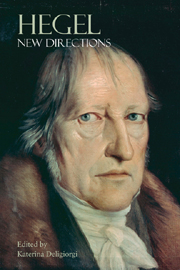Book contents
- Frontmatter
- Contents
- Contributors
- Acknowledgements
- Abbreviations
- Introduction: On reading Hegel today
- 1 Hegel on conscience and the history of moral philosophy
- 2 The apperceptive I and the empirical self: towards a heterodox reading of “Lordship and Bondage” in Hegel's Phenomenology
- 3 Hegel, McDowell and recent defences of Kant
- 4 Substance, subject and infinity: a case study of the role of logic in Hegel's system
- 5 Dialectic as logic of transformative processes
- 6 Hegel, ethics and the logic of universality
- 7 Recognition and reconciliation: actualized agency in Hegel's Jena Phenomenology
- 8 The contemporary relevance of Hegel's practical philosophy
- 9 Catching up with history: Hegel and abstract painting
- 10 New directions in Hegel's philosophy of nature
- 11 Hegel and the gospel according to Immanuel
- 12 What is conceptual history?
- 13 On Hegel's interpretation of Aristotle's psyche: a qualified defence
- Bibliography
- Index
3 - Hegel, McDowell and recent defences of Kant
- Frontmatter
- Contents
- Contributors
- Acknowledgements
- Abbreviations
- Introduction: On reading Hegel today
- 1 Hegel on conscience and the history of moral philosophy
- 2 The apperceptive I and the empirical self: towards a heterodox reading of “Lordship and Bondage” in Hegel's Phenomenology
- 3 Hegel, McDowell and recent defences of Kant
- 4 Substance, subject and infinity: a case study of the role of logic in Hegel's system
- 5 Dialectic as logic of transformative processes
- 6 Hegel, ethics and the logic of universality
- 7 Recognition and reconciliation: actualized agency in Hegel's Jena Phenomenology
- 8 The contemporary relevance of Hegel's practical philosophy
- 9 Catching up with history: Hegel and abstract painting
- 10 New directions in Hegel's philosophy of nature
- 11 Hegel and the gospel according to Immanuel
- 12 What is conceptual history?
- 13 On Hegel's interpretation of Aristotle's psyche: a qualified defence
- Bibliography
- Index
Summary
According to Graham Bird, the interpretation and critique of Kant recently defended by John McDowell in his book Mind and World is “fundamentally mistaken” (Bird 1996: 219). Bird is not alone in holding this view; it is also shared by other prominent Kantians such as Henry Allison and Michael Friedman. All agree that the account McDowell provides of what he calls the “transcendental” side of Kant perpetuates unfortunate myths about the nature and implications of Kant's idealism, myths forcefully articulated by P. F. Strawson, and by Hegel more than a century earlier.
In the name of setting the record straight, Allison, Bird and Friedman undertake to defend Kant's idealism anew. The myths, they tell us, are products of misinterpretation. What is more, the myths can set us off on an unfortunate philosophical track, as is evident, they argue, in the case of McDowell. The myths can in other words encourage in us the misguided view not merely that there is something valid about the Hegelian critique of Kant, but also that there is something compelling or attractive about the Hegelian alternative. This explains why in the course of their efforts to correct misinterpretation, the Kantians in addition seek to convince us of the virtues of transcendental over absolute idealism. While Kant, they suggest, has the good sense to draw attention to the limits of our knowledge, Hegel seems intent upon persuading us to ignore them.
- Type
- Chapter
- Information
- HegelNew Directions, pp. 49 - 68Publisher: Acumen PublishingPrint publication year: 2006

